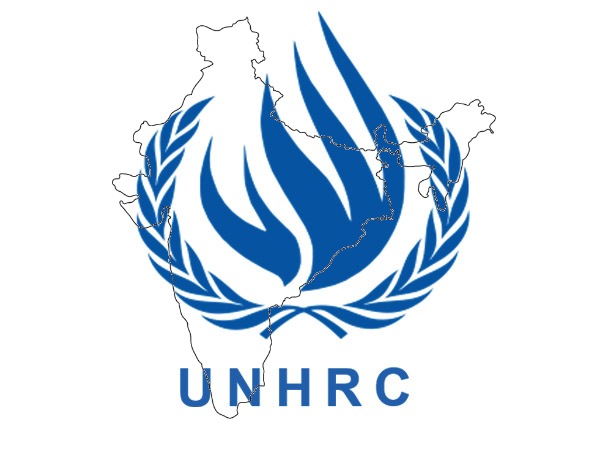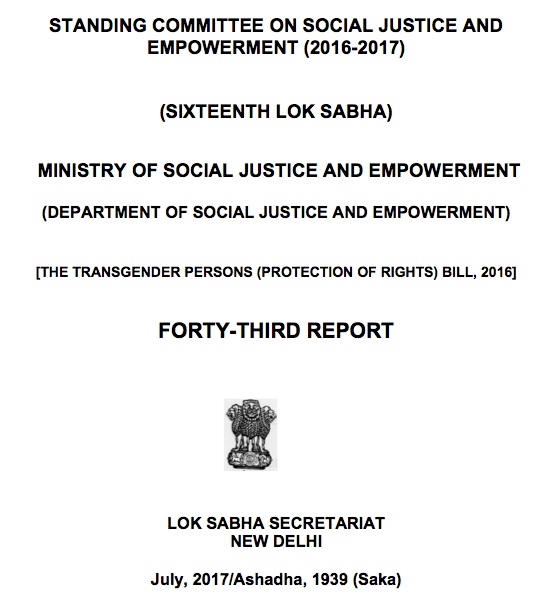Appeal to GOI: Vote Against Suspension of UN LGBT Expert

 Letter [download PDF] to be sent to Ministry of External Affairs and Ambassador, Permanent Mission of India. Those who would like to add their endorsements are requested to do so as comments on this post. The endorsements will be added to the letter before it is submitted.
Letter [download PDF] to be sent to Ministry of External Affairs and Ambassador, Permanent Mission of India. Those who would like to add their endorsements are requested to do so as comments on this post. The endorsements will be added to the letter before it is submitted.
Date: will be added
To
The Hon’ble Minister Smt. Sushma Swaraj
The Ministry of External Affairs,
Government of India
Room No. 169, South Block,
New Delhi-110011
Telephone: +91 11 23011127, +91 11 23011165
E-mail: [email protected]
&
The Ambassador Permanent Mission of India
235 East 43rd Street
New York, N.Y. 10017, USA
Telephone: (212) 490-9660, -9661; Telefax: (212) 490-9656
e-mail: [email protected]; [email protected]
Subject: Regarding vote by India at the Third Committee regarding the suspension of the work of the First UN Expert on Sexual Orientation and Gender Identity on <date will be added later>
Dear Honourable Minister Smt. Sushma Swaraj and Ambassador Mr. Syed Akbaruddin,
On 30 June 2016, the United Nations Human Rights Council (UNHRC) in a historic decision, adopted a resolution (A/HRC/RES/32/2) to establish the first UN Independent Expert on Sexual Orientation and Gender Identity to address the grievous issues of violence on and discrimination against persons based on sexual orientation and gender identity (popularly known as the SOGI mandate). The resolution entitled “Protection against violence and discrimination based on Sexual Orientation, and Gender Identity” had initially been brought by seven Latin American Member States – Argentina, Brazil, Chile, Colombia, Costa Rica, Mexico and Uruguay. The resolution was put to vote after a failed no-action motion brought by Kingdom of Saudi Arabia (KSA) and adoption of few amendments sought by Pakistan on behalf of the Organization of Islamic Conference (OIC) Member States excepting Albania. It was later adopted with 23 countries voting for and 18 against the resolution while 6 abstaining from it. However, unlike the establishment of other special procedures, the countries which were on the losing side of the vote such as the OIC countries led by KSA and Pakistan, excepting Albania, as well as Russian Federation stated that they would not cooperate with the mandate.
Pursuant to the above decision, the African Group introduced a hostile resolution against the SOGI mandate before the General Assembly Third Committee in November 2016, stating that it ‘decides to defer consideration of and action on Human Rights Council resolution 32/2 of 30 June 2016 on protection against violence and discrimination based on sexual orientation and gender identity, in order to allow time for further consultations to determine the legal basis upon which the mandate of the special procedure established therein will be defined.’
The African Group in their statement went on to call for the ‘suspension of the activities of the appointed Independent Expert pending the determination of this issue.’ Among the reasons underlying this call was that ‘non-internationally agreed notions such as sexual orientation and gender identity are given attention, to the detriment of issues of paramount importance such as the right to development and the racism agenda.’ The African Group also stated that the appointment of the Independent Expert would ‘delve into matters which fall essentially within the domestic jurisdiction of States counter to the commitment in the United Nations Charter to respect the sovereignty of States and the principle of non-intervention.’ Now the resolution will be up for vote on <date will be added later> United Nations General Assembly (UNGA).
We write to urge you to vote and argue against this hostile resolution on the following grounds:
- The proposed resolution is in effect a colourable no-action motion, seeking to defer action on the UNHRC resolution 32/2 indefinitely. The Member States of the UNHRC have already rejected such motion brought by the distinguished representative of the KSA, Mr. Faisal Bin Hassan Trad, when the resolution 32/2 had been taken up for consideration at the June session of UNHRC in Geneva earlier this year as stated above.
- There is no real basis for questioning the legal validity of the adopted resolution 32/2 – the legal basis inarguably is in line with the legal basis on which previous three resolutions related to SOGI adopted by the UNHRC were founded: the principles of universality and non-discrimination enshrined in the Universal Declaration of Human Rights (UDHR), and the Council’s responsibility – under OP2 of UNGA resolution 60/251 – for “promoting universal respect for the protection of all human rights and fundamental freedoms for all, without distinction of any kind and in a fair and equal manner.” You also might want to recall that India ratified all the aforementioned principles and other principles upholding human rights in the past. The legal basis underpinning the rights of LGBTQI+ individuals to be protected from violence and discrimination are also fully articulated in the two reports – A/HRC/19/41 and A/HRC/29/23 – that the UNHRC requested of the UN High Commissioner for Human Rights.
- The argument of the African Group that protection of SOGI rights detracts from the right to development and the anti-racism does not sit well with an analysis of the mandate of the SOGI Expert. It intentionally ignores the fact that the SOGI mandate is envisaged as an intersectional mandate. In a preambular paragraph, the mandate is tasked with ‘Undertaking to support its broad and balanced agenda, and to strengthen the mechanisms addressing issues of importance, including fighting racism, racial discrimination, xenophobia and related intolerance in all their forms’. The OP-2 of the adopted Resolution 32/2 is explicitly committed to ‘address the multiple, intersecting and aggravated forms of violence and discrimination faced by persons on the basis of their sexual orientation and gender identity.’
- The logic of the African group that the very appointment of the Independent Expert interferes with the ‘domestic jurisdiction’ and ‘sovereignty’ of the State is inconsistent with the mandate of the Independent Expert on SOGI. The Independent Expert as per his mandate in resolution 32/2 is expected to
- ‘assess the implementation of existing international human rights laws and standards’,
- ‘to raise awareness of violence and discrimination against persons on the basis of their sexual orientation or gender identity’,
- ‘to engage in dialogue and consult with States and other relevant Stakeholders’,
- ‘to work in cooperation with States in order to foster the implementation of measures that contribute to the protection of all persons against violence and discrimination based on sexual orientation and gender identity’.The fact that concerns with respect to violations on grounds of SOGI will be raised by the Independent Expert cannot of itself amount to a violation of sovereignty especially when the mandate holder task is laid down in language such as ‘assess’, ‘raise awareness’, ‘engage in dialogue’ and ‘work in cooperation’.
- While differing views on the resolution 32/2 do exist, it was validly adopted at the Council after an open and extensive debate by a vote of 23-18. You might want to recall that about the same degree of support was visible for the 2011 SOGI resolution brought by South Africa, with 23 votes in favour and one more vote in opposition. It is clear that the creation of an Independent Expert at the June session of the UNHRC was fully within the mandate and authority of the Council, and a mandate-holder was appointed at the September session without a vote, and has already assumed office and begun work.
- If the Third Committee now attempts to undo a decision validly taken by the UNHRC and if India votes in favour of such an attempt, it would essentially mean that any Council resolution could be re-opened and the Council’s authority to fulfill its mandate would be substantially undermined and unravelled. It would further be contrary to the established institutional relationship between the UNGA and the UNHRC, as outlined in resolution 60/251 which established the Council and affirmed by resolution 65/281 which reviewed the Council’s work and functioning. India in the past stood up against aggravated group of nations which had wanted to make a mockery of the existence of the UNHRC and should maintain its stand this time as well.
- The adoption of this hostile resolution will be very harmful to anti-violence and anti-discrimination efforts in relation to LGBTQI+ individuals. It would send out a dangerous message to the perpetrators as well as to the millions victims across the globe including India that LGBTQI+ individuals are not entitled to full protection under international human rights law, and imperil the rights of LGBTQI+ individuals worldwide.
- India’s vote is also important in the context of the recent development around transgender individuals’ rights in India. The recent draft bill, entitled Transgender Persons (Protection of Rights) Bill 2016, tabled by Ministry of Social Justice and Empowerment (MSJE) at Loksabha, the lower house of Indian Parliament, underlines the effort taken up by Indian government to comprehend the systematic human rights violations against individuals on the basis of their gender identity and address them. Although the draft bill is not completely in accordance with Supreme Court of India’s verdict in NALSA vs. Union of India pronounced in April 2014 and is now up for another round consultation from the community and larger society, MSJE’s draft bill does recognize the violence and discrimination faced by transgender individuals in India and acknowledges the importance of having a mechanism. A vote in favour of the upcoming resolution will only give a message that various ministries of Indian Government are not in sync with each other – that the government is contradicting itself.
- India’s abstention on Resolution 32/2 at the June session of UNHRC had later been clarified by Mr. Vikash Swarup, the Spokesperson of the MEA – by invoking the legal realities around Section 377 of The Indian Penal Code (IPC) , he justified India’s stand at UNHRC in Geneva. Section 377 of the IPC however only criminalizes certain sexual behaviours (carnal intercourse against the order of nature) and not the identities and social behaviours of LGBTQI+ Indians. Since being LGBTQI+ is not a crime in India, protecting their fundamental rights including their right to life is a constitutional mandate on the Indian government. So, tying Section 377 IPC with the resolution which was adopted to protect the vulnerable LGBTQI+ individuals against violence and discrimination is itself a misapplication of the law. You might also want to recall that on 21 December 2013, the Government of India filed a review petition against the Supreme Court’s verdict which had upheld IPC Section 377. This clearly clarifies Indian Government’s stand on Section 377 and there is no reason to believe that the government has changed its position in last three years.
Therefore, we urge you to:
- Vote against the upcoming resolution tabled by African group and thoroughly support resolution 32/2 on protection against violence and discrimination based on SOGI in all possible ways, including by raising awareness about the importance of such a mandate amongst other member states.
- Ensure discussion when the report of the Independent Expert is introduced in the UN, including by opposing any hostile tactics with a view to protecting individuals from violence and discrimination based on their real or perceived SOGI.
We thank you for your cooperation.
Yours sincerely,
1. Maya Sharma. Vikalp Women’s Group, Vadodara, GJ
2. Laxmi Narayan Tripati, Astitva Trust, Mumbai, MH
3. Jijo Kuriakose, Queerala, Kerala, KL
4. Rajesh Srinivas, Sangama, Bengaluru, KA
5. Meera Raghavendra, Women’s Initiatives (WINS), Tirupati, AP
6. Pawan Dhall, Varta Trust, Kolkata, WB
7. Kolkata Rainbow Pride Festival (KRPF), Kolkata, WB
8.Nazariya, Queer Feminist Resource Group, New Delhi, DL
9. Chayanika Shah, Labia, A Queer Feminist LBT Collective, Mumbai, MH
10. Saravanan, Aneka, Bengauru, KA
11. L Romal M Singh, Human Rights Law Network, Bengaluru, KA
12. Umesh P, Executive Director, Jeeva Human Rights Organizations for Sexual Minorities, Bengaluru, KA
13. Sappho for Equality, A Queer Feminist LBT Collective, Kolkata, WB
14. MS Manjula, President, Karnataka Sexual Minorities Forum (KSMF)/Karnataka Transgender Samithi, Human Rights Organizations for Sexual Minorities in Karnataka, KA
15. MS Chandini, President, Payana/Karnataka Transgender Samithi, KA
16. Dr. Akkai Padmashili, Ondede and Swatantra/Karnataka Transgender Samithi, Bengaluru, KA
17. Sonu Niranjan, Secretary, Samara/Karnataka Transgender Samithi, KA
18. Anjali Gopalan, Executive Director, NAZ Foundation, New Delhi, DL
19. Maharashtra Trithiya Panthi Sangatana, MH
20. Advocacy Rights of Transgender and Hijras (ARTH), MH
21. Team theCake, “cake.youthkiawaz.com”, Media, New Delhi, DL
22. Tanmay, Praarambh Trust
23. Pavitra Nimborkar Samarpan Trust
24. Abhirami, Ekta Foundation
25. Satyashree, Darpan Foundation
26. The Lesbian and Gay Vaishnava Association, Mumbai, MH
27. Reshma Prasad, Dostanasafar, BR
28. Abhijit Majumder, Professor, Mumbai, MH
29. Vivek Divan, Lawyer, New Delhi, DL
30. Harish Iyer, Equal Rights Activist, Mumbai, MH
31. L. Ramakrishnan, Chennai, TN
32. Moulee, Chennai, TN
33. Rahul Sinha Roy, Kolkata, WB
34. Avinaba Dutta, Kolkata, WB
35. Jia Das, Freelance Writer, Kolkata, WB
36. Danish Sheikh, Lawyer, New Delhi, DL
37. Surabhi Shukla, Lawyer
38. Abhina Aher
39. Saurabh Bondre, Thane, MH
40. Gireesh, Chennai, TN
41. Elavenil, Chennai, TN
42. Anis Ray Chaudhuri, Diamond Harbour, WB
43. Siddhartha Shankar Talukder, Calcutta, WB
44. Tiju Thomas, Academician and Scientist, Indian Institute of Technology Madras
45. Ikshaku Bezbaroa, Lawyer, Delhi
46. Gopi Shankar Madurai, Srishti Madurai
47. Pratulananda Das, Professor, Jadavpur University, West Bengal
48. Xukia – LGBTQ Collective, Assam
49. Deb Gopal Mondal
50. Arpan Kundu, Chennai
51. Nivedita Saksena, Lawyer, New Delhi
52. Suparna Kanti Pal
53. Gina V., Bengaluru
54. Orinam LGBTQIA+ collective, Chennai
55. Jaydip Jana, Kolkata, WB, Assistant Director at West Bengal State AIDS Prevention and Control Society
56. Ranjita Sinha, Association of Transgender and Hijra in Bengal (ATHB), Kolkata, WB
57. Samarpan Maity, Researcher, Kolkata WB
58. Prosenjit Pal, Researcher, Kolkata, WB.
59. Bessimon Thankaraj, Volunteer – Orinam, Board Member – Queerala
60. Manthan Khakharia
61. Anitha Jayaraman
62. Harshit Agrawal
63. Shekhar Choudhary, New Delhi
64. Vikram Sundarraman, Chennai
Those who would like to add their endorsements are requested to do so as comments on this post. The endorsements will be added to the letter before it is submitted.
Further Reading
HRW. 2016. UN Makes History on Sexual Orientation, Gender Identity. https://www.hrw.org/news/2016/06/30/un-makes-history-sexual-orientation-gender-identity. Human Rights Watch.
Dutta, Avinaba. 2016. India Flouted Our Constitutional Values By Abstaining From LGBT Vote In UN. Huffington Post, India. http://www.huffingtonpost.in/avinaba-dutta-/india-flouted-our-constitutional-values-by-abstaining-from-lgbt/
Narrain, Arvind. 2016. India Must Support Universal Human Rights by Voting Against Suspension of UN LGBT Expert. http://thewire.in/78288/india-must-show-support-for-universal-human-rights-by-voting-against-suspension-of-first-un-lgbt-expert/. TheWire.in



Thanks to the authors of this wonderfully worded, and clear letter. Kindly add me in as an endorser too. My details are as follows:
Tiju Thomas, Academician and Scientist, Indian Institute of Technology Madras
Thanks for your endorsement. Will add your name in the list.
I am a queer lawyer from Delhi, and I’d like to endorse this in a personal capacity
Thanks for your endorsement. Will add your name in the list. It would be also great if you can share this letter with several other lawyers and lawyers’ collective including ICJ.
Please add my name to the list of endorsees:
Nivedita Saksena, Lawyer, New Delhi
I am also endorsing this
Gopi Shankar Madurai – Srishti Madurai
Thanks Gopi for your endorsement. Will add your name and the name of the organization in the list.
I am endorsing it
If it is not too late, Xukia – LGBTQ Collective, Assam would like to endorse it too
I want to endorse.
I am endorsing it.
With due respect to the constitution of India, India is a signatory to UNHR and is therefore should uphold the priciples. With regard to the argument about legality the matter is sub judice and so there is no legal complusion not to abstain. Infact it is good ground to abstain.
I am endorsing.
I am endorsing.
Bessimon Thankaraj,
Volunteer – Orinam,
Board Member – Queerala.
Thanks.
I edorse this
I’ll endorse this.
I am endorsing
I am endorsing.
Shekhar Choudhary, New Delhi
I would like to endorse this letter.
I am endorsing this.
I endorse this as a global, and an Indian citizen, and as a person who has faced challenges and discrimination in India.
I would like the Government of India stand up for, not against, equality.
I endorse this.
LGBT rights are human rights to be respected and it is necessary to prevent marginalisation of LGBT individuals
I am a heterosexual male and a practicing Muslim and I endorse this as all humans have a right to be treated without discrimination and be protected against any sort of violence.